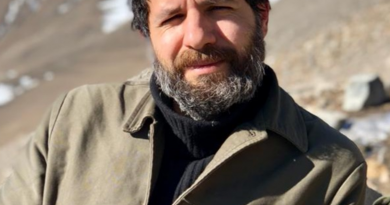AUC Enacts New Intiative to Combat Sexual Harassment
By: Hanya Captan & Nesrien Abdelkader
@HanyaCaptan
@NesrienAshraf
The American University in Cairo released a statement September 7 that it will launch an investigation into recent allegations of misconduct committed by AUC alumni and possibly current students.
A week earlier, President Francis Ricciardone addressed similar community concerns, when he said in a university-wide email that the AUCSpeakUp initiative will reinforce AUC’s characteristic campus equity, inclusiveness and safety for all.
The initiative comes as a response to the recent case of Ahmed Bassam Zaki, a prolific sexual harasser. Zaki’s crimes were widely circulated on social media, eventually resulting in his arrest. According to the news website Egyptian Streets, he has since been referred to criminal court on charges of sexual harassment including that of minors on September 1.
AUCSpeakUp is a campaign designed to provide advice to people who witness or experience any form of harassment, and “to make sure that any victims of sexual harassment know how to get help,” Ricciardone said.
During the #AUCSpeakUp Campus Conversation that took place on July 16, Ricciardone announced that the Title IX office will be renamed the “Office of Institutional Equity”. This decision is intended to further emphasize the office’s role in the AUC community.
In a further attempt to combat this rampant issue, President Ricciardone also announced mandatory online anti-harassment training for the entire community.
“Further steps going along with that, is training. People need to know what is tolerable, what is acceptable, what is right…So we will be doing training for all, mandatory training, that’s another new thing, we have had training available, we will make it a) mandatory, and b) universal for all students, faculty, and staff.”
Ricciardone also went on to explain that university leadership will be amongst the first to receive the training.
“We are the first in Egypt to introduce mandatory online anti-harassment training to all faculty, staff and students. Our entire University leadership — including all deans, vice presidents and department chairs — will join me in the first groups to participate in the training,” Ricciardone added.
The Title IX office and the Center of Student Wellbeing (CSW) have also extended a reminder to students of how their services can aid them.
Title IX Coordinator Reem El-Mograby explained that when a sexual harassment complaint is received, she proceeds to contact the complainant to talk more about the case in order to better understand it.
“The reason we do this is people are also afraid when they document something, when they write down a complaint, they are also afraid to write down certain details because they don’t know where this is going to be, who’s going to see [it],” El-Mograby said.
The Title IX office then has to determine whether the violation being brought to them is a violation of the code they deal with (i.e. of a sexual nature) or another code.
“For example, if there is harassment but not of a sexual nature, [then] that’s under the code of student conduct,” El-Mograby said.
If the case is determined as being one for the Title IX office, El-Mograby then meets with the respondent. Multiple meetings must be conducted in order to extract the most information necessary to decide a sanction.
El-Mograby will also conduct consultations with subsequent offices, such as the Office of the Provost, Dean of Students, HR etc. to help her reach a decision.
She stresses that confidentiality is maintained during the phase of consultation, and information is only shared on a “need to know” basis with the above offices. She will not disclose names, ID’s or any other information to the subsequent office, but will instead pose the situation as involving student X and student Y, and ask for a suggested sanction.
“[Sanctions] could start with a warning and a no-contact order [or they] could go all the way to an expulsion or suspension — it really depends on the nature of the case and the context…[this is] why I said we talk with students, because sometimes it doesn’t look like a severe case until we receive more details about the case itself,” El-Mograby said.
According to the Title IX office’s timeline, this process of investigation can take up to 60 days as not all the information is immediately available. However, El-Mograby reassures that they often finish investigating a case well before they reach the 60-day mark.
Ricciardone announced earlier the relocation of the Title IX office to report directly to the President’s office in order to make it more accessible to all members of the AUC community.
Handling a traumatic situation such as sexual assault, harassment or blackmail does not end with filing a complaint. AUC provides survivors with several options to help them deal with the emotional and psychological issues that could result.
The CSW offers a safe and supportive space for survivors to come where they won’t face judgement or pressure. It is continuing to support students during the current period of online learning through virtual counseling sessions via Zoom.
An emergency hotline is also available to direct the caller to a counselor immediately. The number for the AUC Medical Services hotline is +2.2.615.4000.
Chief Clinical Officer at the CSW Ola Morsy explained that the office is devised of a group of professional, experienced counsellors who are well equipped to handle any crisis students may be facing.
“From experience, clients feel much better talking to professionals in such situations as we offer a confidential, trustful and nonjudgmental setup that let the client feel validated and understood,” Morsy said.
Morsy encourages clients who come in to report the incident if they are ready for it, especially if the incident occurs on campus. However, most of the cases she hears do not.
“This is an empowering act that starts proper healing as feeling helpless usually enhances the feeling of trauma, which in such a situation is absolutely unfavorable. The degree of anger begins to fade when they do something about it and vice versa when they remain silent,” she said.
The Title IX office and the CSW are in close proximity and they work together to support the survivors, however, they both offer different roles to the AUC community.
General Counsel and Chief Compliance Officer, Sunanda Holmes said that going to a counselor might give the survivor the push they need to eventually come forward and report to the Title IX office if they ever faced misconduct on campus; thus one unit supports the other.
“Nothing that a person says to a counselor can be used against them in investigation and no one from the Title IX office should know what was said or if this person even saw a counselor,” Holmes told The Caravan.
Vice President for Student Life Deena Boraie assures survivors that the university is doing its very best to protect them and ensure their confidentiality remains intact.
“We can’t just import any prevention strategies; we need to design them. We are going to improve the reporting, and we have very concrete steps to do some research and do better in terms of making our processes clear and accessible,” Boraie said.
Assistant Professor of Psychology Kate Ellis is also available to help anyone who would like guidance on seeking support within the AUC community. Ellis is a clinical psychologist who specializes in treating individuals who have experienced trauma.
There can be consequences for those who choose to come forward, so Ellis understands why some may not want to or don’t feel ready. Every person’s situation is different, and they should not be forced to speak out until, and if, they are ready, but getting support is very important for a person who has survived such an ordeal.
Despite the stigma around publicly coming forward, harassment and assault is a large issue in Egypt. According to a 2013 study by UN Women, 99 percent of women in Egypt have been sexually harassed sometime in their life.
“Internalizing it can be harmful. You need to talk to a trusted person regularly because this isn’t the kind of issue you discuss once and then it’s gone,” Ellis said.


